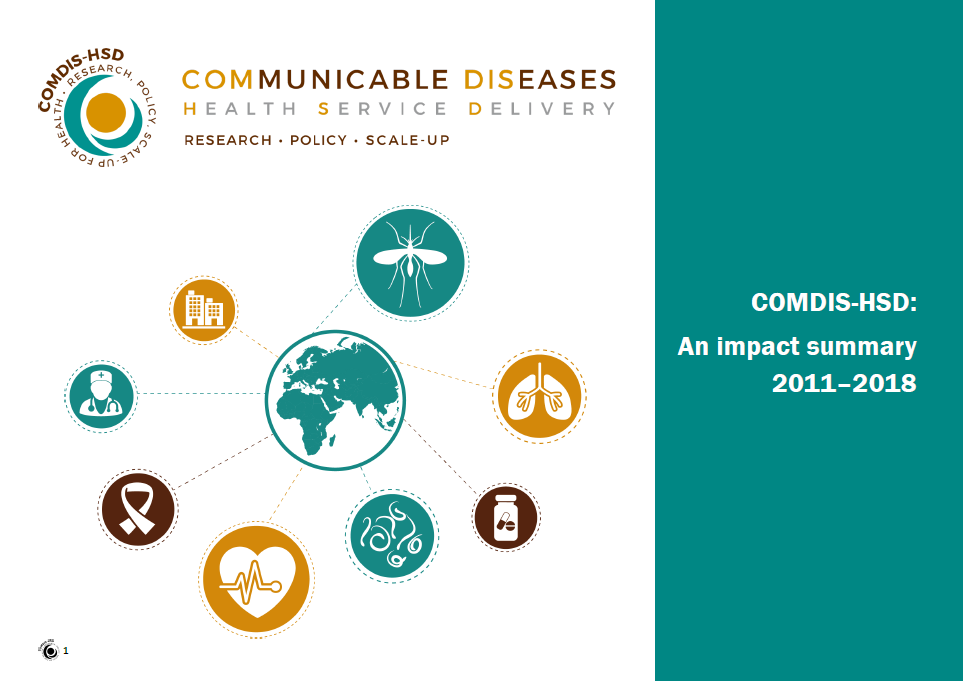
Influencing policy makers and practitioners for better health service delivery
When we originally set up the COMDIS-HSD research programme consortium, our primary intention was to develop research findings that would impact on health policy and practice in our partner countries and beyond. Our aim was to make a difference to the health and lives of many millions of people living in low- and lower middle-income countries (LMICs), and particularly the poorest of those people. This meant moving beyond long-standing and traditional approaches of relying on academic publications to influence others; academic publications were merely a step on the road, rather than the end of the journey.
We are pleased to report that we have met this aim. We have successfully influenced national or wider policy in the fields of antimicrobial resistance, malaria, tuberculosis, HIV, neglected tropical diseases and urban health. Our work focuses on health services delivery (as the HSD in our consortium name emphasises) as we are convinced that many of the health care problems (in the widest sense) in LMICs can be solved by better delivery of existing health care approaches. There must be a balance between discovering new drugs and techniques, and ensuring the people who need drugs and techniques get them. In our view, funding is too heavily skewed towards the former, and we are grateful to DFID for awarding us the funding to allow us to contribute to improving the balance.
Helping to build sustainable and resilient NGO partners
Perhaps the chief contributor to the success of COMDIS-HSD is our NGO partners and their research teams. We should not underestimate the scale of the efforts a small number of individuals have made to create what are now influential national NGOs; and the strengths of the resultant networks of researchers, research uptake staff, support staff and government counterparts. We would like to congratulate the heads of our NGO partners for having the courage, vision and drive to invest in building responsive and resilient research organisations. These NGOs are now sustainable in their own rights, with multiple research partners outside the COMDIS-HSD consortium, and proven abilities to generate substantial research and development funding and deliver a return on that investment. Importantly, they have over many years developed the close links with policy-makers and practitioner groups that are necessary to make sure that research findings are translated into policy and practice in their respective countries.
Our embedded approach
 We have found that a major contributor to COMDIS-HSD’s ability to deliver research that leads to changes in policy and practice is our use of an embedded research and development approach. In brief, this entails ensuring research addresses national priorities and delivers policy-relevant findings; interventions are designed from the outset to be sustainable and scalable; intervention design is heavily influenced by research with potential users – both health care staff and patients/members of the general public – and includes development of all relevant materials and guides, including training materials and processes; after piloting and review, interventions are tested in routine conditions, unsupported by external staff or resources; the research team works with policy-makers to translate research findings into policy; and then uses the materials and guides to run the initial training-of-trainer programmes. In the longer term, we would like to further monitor and evaluate uptake at scale. The consortium’s capacity to carry out embedded research and development stems from an ongoing collaboration between our national NGO partners with skills in research and evidence-led advocacy, and an international research team at the University of Leeds and Malaria Consortium, with skills in advanced research methods and capacity development.
We have found that a major contributor to COMDIS-HSD’s ability to deliver research that leads to changes in policy and practice is our use of an embedded research and development approach. In brief, this entails ensuring research addresses national priorities and delivers policy-relevant findings; interventions are designed from the outset to be sustainable and scalable; intervention design is heavily influenced by research with potential users – both health care staff and patients/members of the general public – and includes development of all relevant materials and guides, including training materials and processes; after piloting and review, interventions are tested in routine conditions, unsupported by external staff or resources; the research team works with policy-makers to translate research findings into policy; and then uses the materials and guides to run the initial training-of-trainer programmes. In the longer term, we would like to further monitor and evaluate uptake at scale. The consortium’s capacity to carry out embedded research and development stems from an ongoing collaboration between our national NGO partners with skills in research and evidence-led advocacy, and an international research team at the University of Leeds and Malaria Consortium, with skills in advanced research methods and capacity development.
As a consortium, we believe that we have achieved much over 8 years. We would like to thank all our supporters at the various ministries, hospitals, rural health facilities, technical working groups, and beyond, for helping us to collectively make a difference. We would also like to thank our Consortium Advisory Group, DFID and all our critical friends for their guidance, clarity and championing of our work and of the embedded approach to research and development.
We hope you enjoy reading about our work and our impact. Rest assured that our work continues through our NGO partners ARK Foundation in Bangladesh; Association for Social Development in Pakistan; HERD International in Nepal; Good Shepherd Hospital in Eswatini (formerly Swaziland); Malaria Consortium across Africa and Asia; and the University of Leeds in the UK.
Prof James Newell and Prof John Walley
Co-directors, COMDIS-HSD

